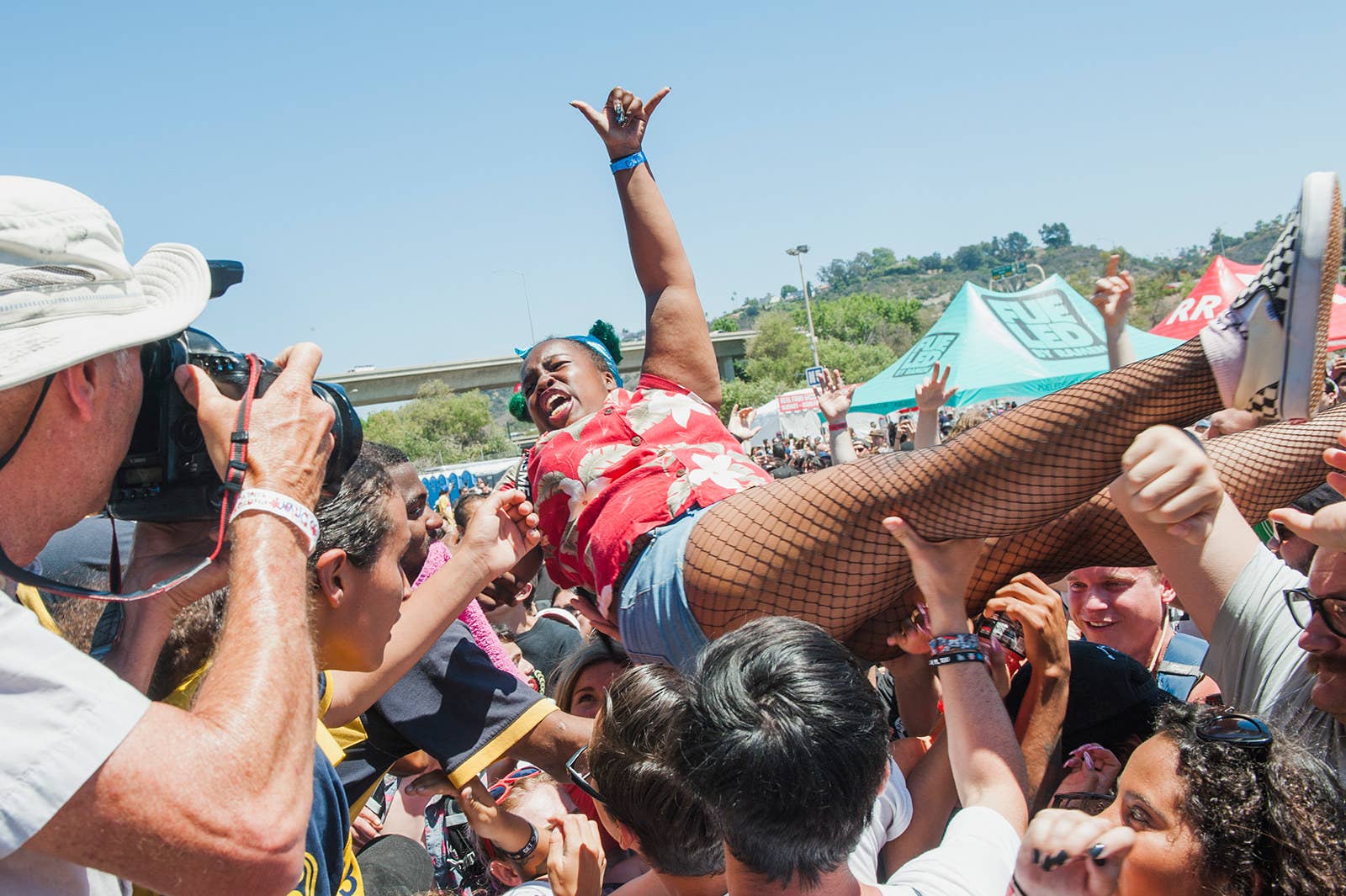
Warped Tour is over for good and I am bummed about it, even though my days of stomping around the grounds of some amphitheater are long gone. To be at Warped was to continually have the question of What disaffection carried you here? asked and answered. It started in 1995, founded by music promoter Kevin Lyman with just 19 bands, mostly hailing from some iteration of the punk genre, spread out over 25 shows across 25 cities. No Doubt and Sublime were the biggest names on the bill, and L7, and a young Deftones. In the following year, Vans became the tour’s main sponsor and by 2001 — my first year attending — there were over 100 bands, sprawled out over five different stages.
Back then, I hadn’t been to a festival, and I'd hardly been to any concerts. I hitched a ride up to Cleveland with some friends because it was summer, and the thought of growing up and going to college terrified me, and I wanted to place two hands at the edge of summer and stretch it out for as long as I could. It seemed like a way to do that was to walk around listening to music I liked but hadn’t fallen in love with yet.
There is a particular moment in the grand story of music discovery, where a person, no longer moved by what they’re currently listening to, has a tape slid across a school bus aisle by an older kid, or blows the dust off a record jacket unearthed in the catacombs of their childhood home. In that moment, the music found on that tape, or on that record, or in the glow of the television screen past bedtime is always transcendent, and it alters the musical direction of the person who discovers it. For me, this moment happened under a tree in 10th grade, when the kind of punk kid who wears a leather jacket in 90% humidity handed me a CD-R. “Sex Pistols” was scrawled across the CD’s silver face in a thin Sharpie so that the edges of every letter appeared dangerous, or violent. The songs were loud and fast and short, a departure from the narrative-driven rap and soul songs I’d attached myself to, or the silent, more meditative rock music I’d grown to enjoy.
The Sex Pistols aren’t the greatest musical introduction to the genre of punk, but the performance of rallying against something, anything — was appealing, and allowed me to chart a map toward more punk, and then its many offshoots: post-punk, garage punk, hardcore, and pop punk. I liked what this music awakened in me, but I didn’t yet have a landscape where I felt like I could fall in love with it. So much of the music and its messaging relied on communal measures as a vehicle to get out both joy and rage, and until my first Warped Tour, I didn’t see, up close, what the music was capable of pulling out of people who I imagined to be like me.
Outsiders are sometimes born out of an unfulfilled desire for inclusion, or sometimes from a desire for exclusion from whatever the mainstream represents, and Warped Tour offered a vision for both of those groups in almost equal measure. Few of the bands who were on Warped, beyond its headliners, could reasonably be considered mainstream, and many of the bands with their names in the small- to medium-sized font on the promotional posters were upstarts or local underground stalwarts. This fostered a sense of intimacy. You could plausibly end up in line to get a shitty slice of pizza behind a person you just saw onstage, or strike up a conversation with band members while waiting to use the same scattered bathroom stalls. There was a draw to this — a commingling out of sounds and groups and experiences that made it impossible for you to not be able to find your people somewhere among the masses.
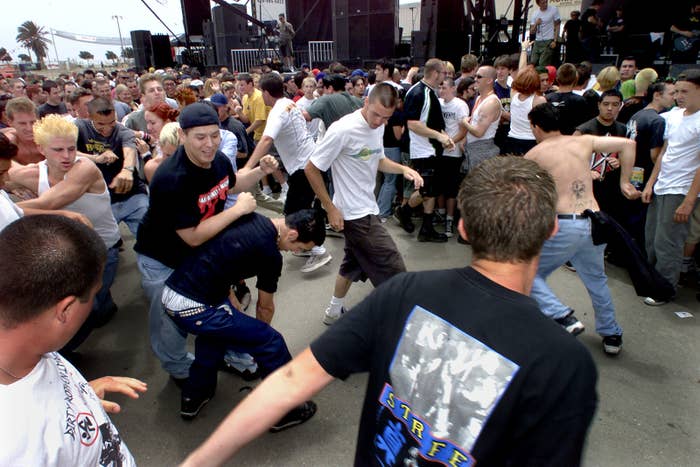
And so I went to Warped Tour again in 2002. I was there when it touched down in Columbus, Ohio, for the first time, and again in the middle of Noblesville, Indiana, where Glassjaw played on a violently humid day and the crowd was so tight that it was hard to tell where my sweat ended and my neighbor’s sweat began, even as I sat underneath a fan in the Uptown Cafe late that night in front of a plate of cheese fries. I was there in Darien, New York, and in Camden, New Jersey, in 2003, for the first taste of Taking Back Sunday and the theatrics of Adam Lazzara, who would twirl a long microphone cord around like a yo-yo, in a manner which seemed both reckless and romantic, the mic swinging but always returning to his body. I was there in Columbus in 2004 to see Fall Out Boy make their Warped Tour debut after following them around Midwest dives and basements for the past two years. In that moment, it felt like watching one of your friends make it as far as they ever would, with everyone who didn’t know your friends there right as they were falling in love with them.
I was there in 2005 for one of the most memorable Warped lineups of all time. The newest emo boom really took off in the time between Warped 2004 and Warped 2005, and so 2005 meant that one could not just peep sets from MxPx and the Transplants, but also see bands like My Chemical Romance play Warped for one last time before they went mainstream. That year also offered new bands to love, like Paramore, who made their Warped debut in 2005. I was at four stops in 2006, dancing alone in the grass at one and sleeping in the car of a stranger while some band played a forgettable set at another. I was there when a storm came in Cleveland in 2007, and I was there in Illinois that same year, when the clouds were white and puffed themselves harmlessly along the deep blue of the sky.
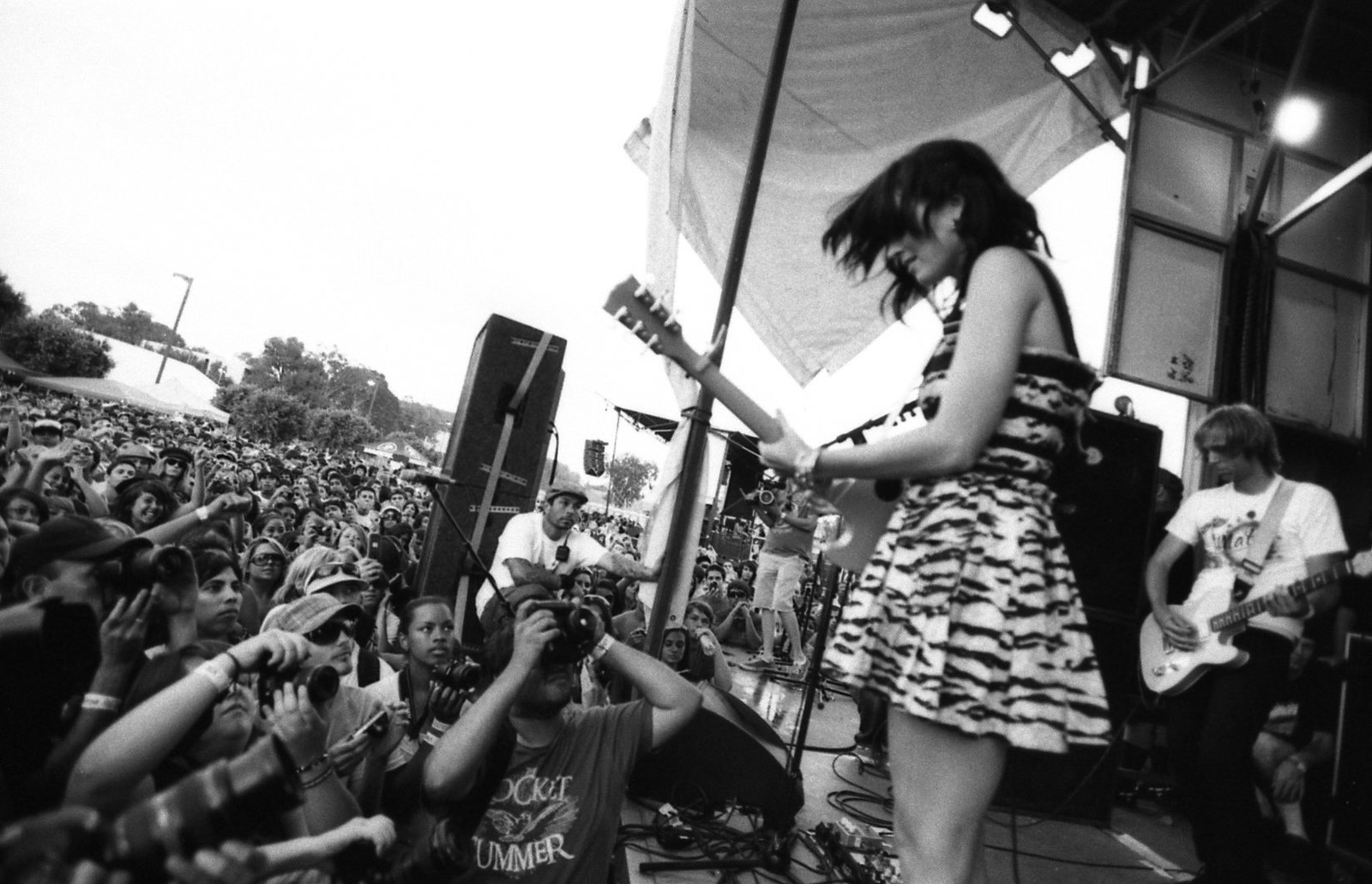
I went in 2008, when a young Katy Perry was added to the lineup, an exhausting moment which made the festival feel cheaper, a little more desperate. It is a cop-out to say that Katy Perry ruined the spirit of Warped for me, but it’s a cop-out I cling to because the truth is a bit harder to come to terms with. I was getting older. I had, in the seven summers I had devoted to Warped, accumulated more responsibilities. I was a teenager when I attended my first Warped, and by 2008, I was approaching my mid-twenties. This is by no means old, but the festival felt more like an obligation than a place of excitement.
I began to consider time differently. There are countless rock ‘n’ roll mantras about wanting to die before growing old, or before you are separated permanently from whatever ideas of youth you once held, and I get it. But for all the waxing poetic about how the soul and spirit can stay young forever, some of us have to survive in a manner that simply won’t allow for it. Some of us have to go to a job where we punch a timecard and then come home too exhausted to drive three hours on a weekend. Time makes fools of the people who plant flags in the ground of their imagined, immovable youth. I sulked through Warped Tour in 2009, went once more in 2010 out of some imagined obligation, and then finally gave in and retired my Warped Tour Road Trip streak.
I didn’t go this final year, though I told myself I should have. I remembered the way my crew and I would look at the early to mid-thirtysomethings who would roam the grounds of Warped somewhat aimlessly. We either assumed they were in a band or, if they weren’t, they were someone trying to relive glory days that were long gone, like the old high school quarterback who pops back into high school parties because no one cares who he is in college. It is an imagined anxiety, sure — but one strong enough for me to wave a dismissing hand and say Let the kids have their fun. I couldn’t have found the time in my calendar if I wanted to, I told myself. The summer is too hot and the bands aren’t good enough and I ain’t getting in anyone’s pit so to hell with it anyway.
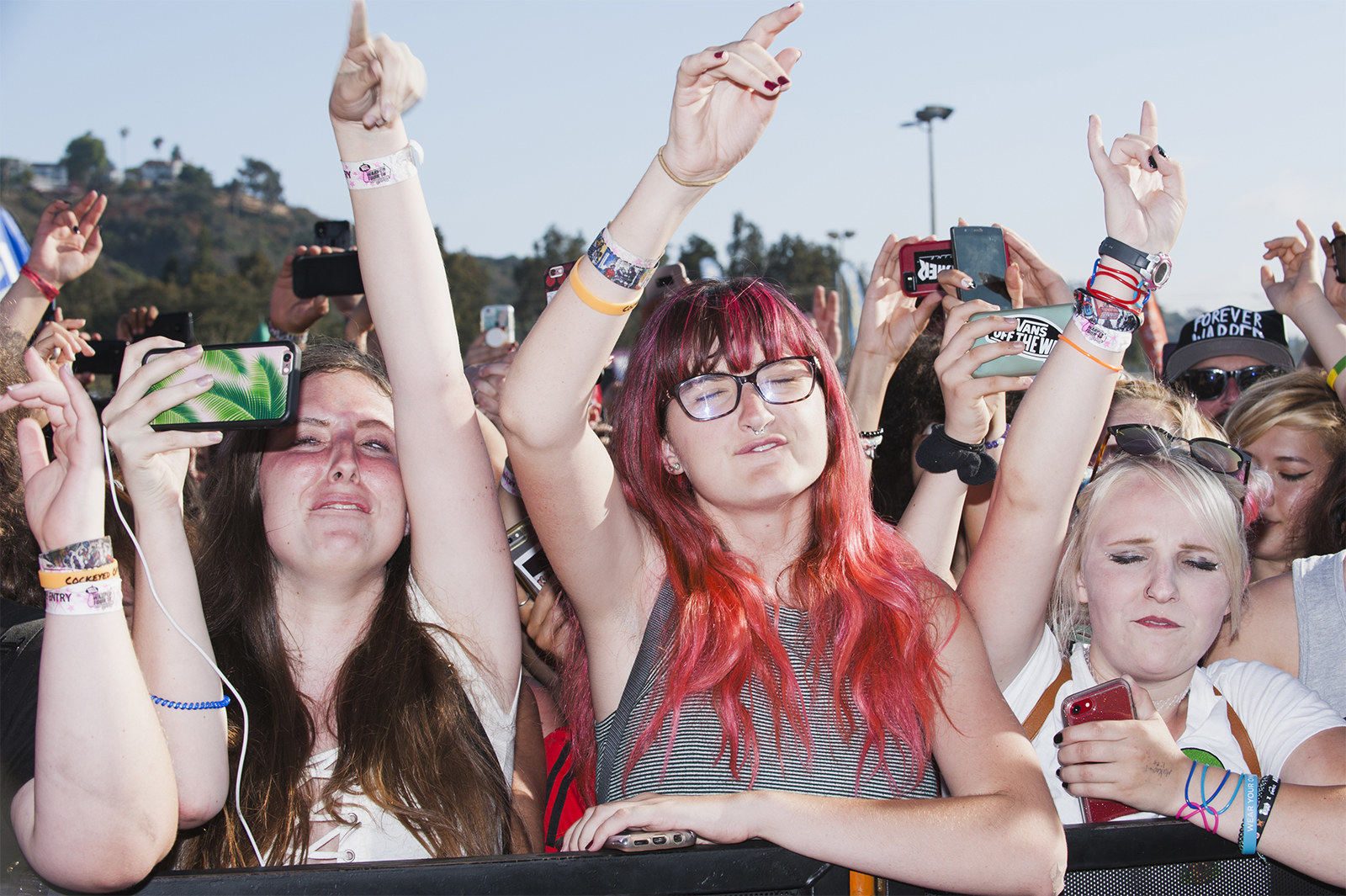
Thinking about Warped Tour’s end, I posed a question on Twitter, asking people to share their favorite Warped Tour memories. A quilt of nostalgia emerged, each square detailed with someone’s mosh pit, or someone else’s scream into a microphone handed down from on high by a singer, or someone else’s time seeing one band bring out guests from another band, and so on and so on. A surprising number of people responded to the tweet saying that they remember a time in 2007 when the rain came from a few threatening clouds over the Tower City Amphitheater in Cleveland and didn’t stop.
They remembered the moments after the storm really picked up, when the bands all ran to their trailers or buses while the winds blew apart stages and the crowd chanted along to a jukebox of their own making, as the water pooled at our feet and grew seemingly higher by the minute. We were no longer running from the rain; we were giving into it entirely.
I knew then that I would miss Warped Tour a lot, though I had found myself ambivalent about its winding down. There was something beautiful about those people who reached across the divide of a timeline to say I was there with you. It was all real.
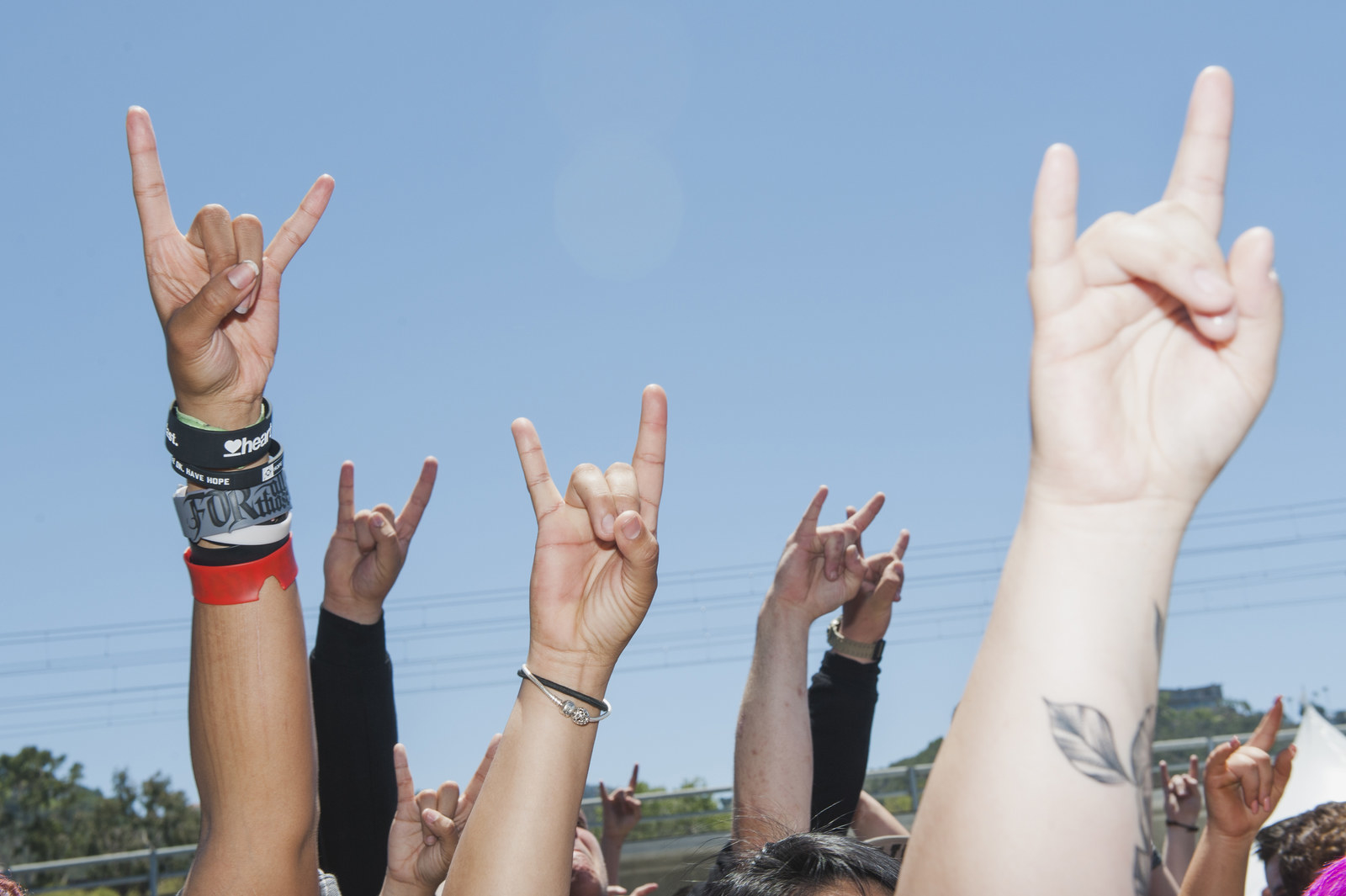
Many festivals, by nature, are at least a little bit predatory. They function in part by cashing in on the grand desire for a communal experience, and the fact that that desire can overshadow the need for all other elements. I can speak beauty into the communal moments of a storm overtaking a festival and soaking its participants while a stage collapsed. And if I speak enough beauty into those moments, you don’t have to ask why there wasn’t adequate cover for a day with a storm in the forecast, or why a stage was not built to safely withstand wind.
This is the gift of a festival, particularly a festival in the open air. There is more room for romanticism, and the margin for error is wider than a concert. If one band at Warped Tour put on a memorable enough set, an attendee could forgive the sets they walked away from displeased. But this, too, is a function of Warped catering to a very specific scene. Many bigger festivals can balance the amount of music with the quality, but with Warped, packing a bunch of bands into a single day over a tight schedule means that you might not see any exciting bands beyond the ones that drove you to buy a ticket in the first place. To gorge oneself on mediocrity is another path to fulfillment, and in the moment, the feeling of fullness outweighs the journey it took to get there.
Warped Tour is over and I say good night and good riddance. It was a festival, after all, and festivals are beholden to their own bottom line first, and the fan experience is a far distant second. Even for those deeply immersed in the nuances of its best moments, Warped was sometimes the poorest reflections of the scenes in the cities where it took place. This wasn’t surprising, but in my times attending, there were few protocols for violence enacted against attendees, and even fewer protocols for the lack of safety felt by women or queer folks. Warped isn’t unique in this way — many festivals fail their attendees in this manner — but for a festival catering to an audience of people who might not feel safe and/or comfortable in their own home communities, actually creating a safe space should be a priority.
At Warped 2015, festival producer Kevin Lyman allowed Jake McElfresh (who performed under the name Front Porch Step) to join the tour in Nashville after being accused of sexual misconduct with minors earlier in the year. Lyman insisted the move was to grant McElfresh a “second chance,” while seemingly ignoring that giving McElfresh access and power to the young women he was accused of preying on wasn’t a great idea.
As a result, many bands who would have shared a stage with McElfresh canceled their performances, and bands who weren’t sharing a stage with him called on festivalgoers to boycott his performance. (A performance that included McElfresh taunting an audience member who heckled him.) This was just the latest misstep for Lyman, who often claimed to be listening to conversations about sexual safety at Warped, but remained confident that Warped was doing a good job policing itself, capable of dealing with sexual harassment only on its own terms, in a manner that largely served its artists first.
But the festival reflects the scene that reflects the music, which was largely born out of the emotional turmoil of men who imagined themselves to be tortured without considering how they might be capable of torture.
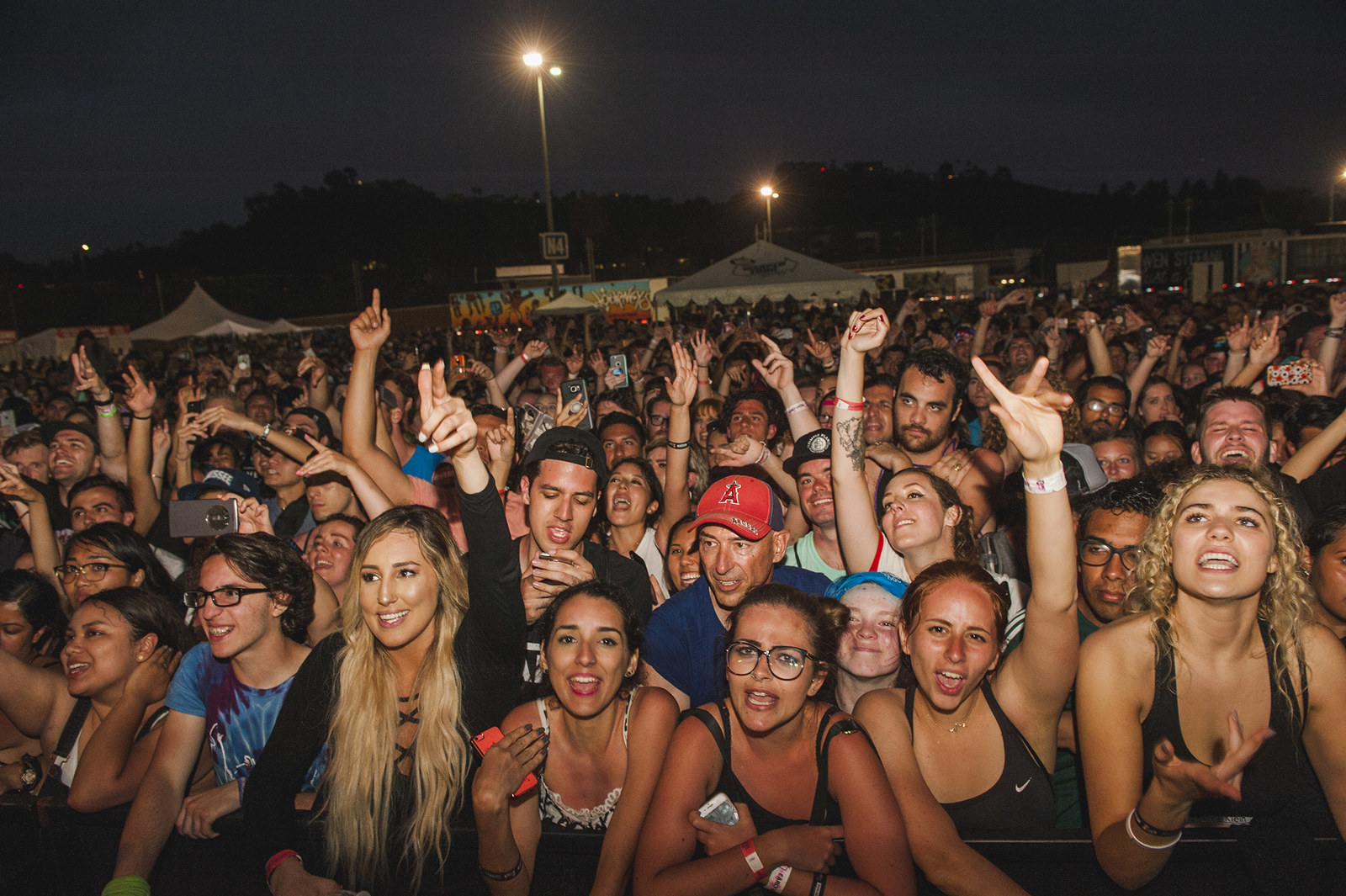
Warped Tour is over and I will miss it as much as you might miss it, friends. Warped Tour is over and I hated it as much as you hated it sometimes. Warped Tour crawled off into the dark gray sky last week and I hung art in an apartment and shopped for winter clothes before summer was even ending and researched retirement accounts while mumbling about how none of us are going to be alive to spend the money we’ve saved. There is no more Warped Tour as I type this now, and I don’t desire the sweat of another person pressed into my back while my ears ring, but I do desire a memory of it, kept in a box where the moment looks more beautiful than it actually was. I don’t miss the 36-hour romances with girls met on the same road to the same show or in line for the same band T-shirt. I don’t miss the false promises to call and stay in touch with the people I deemed family over the howl of some lyrics we both knew, but then never spoke to again. Warped Tour was always going to fail because it was loved as a concept first, and loved by too many people who came to it vulnerable and looking for more answers than it could provide. But it served enough moments. Warped Tour was a flawed home, but no more flawed than the many homes I chose for myself outside of it. Long live the parts of Warped Tour that still echo beautifully in the hearts and minds of those who need it most. ●
Hanif Abdurraqib is a poet, essayist, and cultural critic from Columbus, Ohio. His first collection of poems, The Crown Ain't Worth Much was released in 2016 and was nominated for the Hurston/Wright Legacy Award. His first collection of essays, They Can't Kill Us Until They Kill Us, was released in fall 2017 by Two Dollar Radio.
